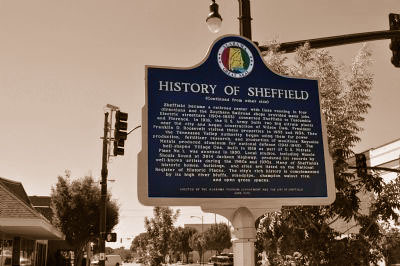
The town of Shefffield Alabama began as a vision of Alfred Moses.
A new Milestone Monday feature
This morning's Jewish World Review carried This Story [click to read] about a little known pioneer of industry in Alabama, Alfred Huger Moses. He was born in 1840, the oldest son of Levy and Adeline Moses of Charleston, South Carolina. He graduated from the College of Charleston at age 20 and moved to Montgomery, Alabama, where he apprenticed in a law office. The year was 1960. The next year, war began and he became the clerk of the Confederate District Court in Montgomery and joined the Alabama Rebels volunteer militia company.
Along with his brothers Mordecai and Henry, Alfred became an important player in Montgomery's real estate market. Mordecai Moses was elected mayor of Montgomery in 1875. He later served as president of the Montgomery Gas and Electric Light Company. In 1887, Montgomery's first "skyscraper." the Moses Building, was financed by the three brothers.
In 1880 coal and iron ore were being discovered in Northern Alabama. The railroad junction of Birmingham was booming. Alfred envisioned a new town that would surpass Birmingham as a manufacturing center. "Alfred Moses envisioned building a city that would surpass Birmingham. In 1883, Moses toured some mines near Florence, Alabama. Viewing the rolling hills across the Tennessee River from Florence, Moses thought he found the ideal spot for a new city, which he named Sheffield after the great steel producing city in England." -- American Jewish Historical Society.
The town's beginnings were anything but smooth. Bank failures and economic uncertainties delayed the actual construction of the town until 1885. In 1887 Sheffield was a booming industrial city. In 1891 the town's industry failed and the family's fortunes were lost. " Alfred Moses had miscalculated the willingness of railroads to link Sheffield with major cities and had overestimated the region's iron ore supply. When the market price for iron dropped below $12 per ton, less than the cost for Sheffield's foundries to produce and deliver it, the town's furnaces were banked and most of its residents departed. Moses and his family moved to St. Louis and lived there for another thirty years in greatly reduced circumstances, his dreams destroyed by the boom and bust cycle of the Gilded Age." -- American Jewish Historical Society.
Alfed's children became successful enterpenuers in a number of fields. His mills in Sheffield were opened again in 1901, failed in 1907 and were then purchased by United States Steel who operated them until 1929 when the Great Depression shuttered them for good.




No comments:
Post a Comment